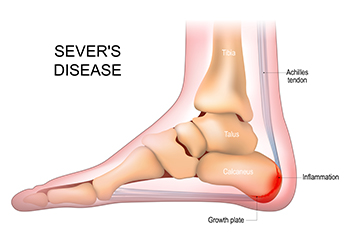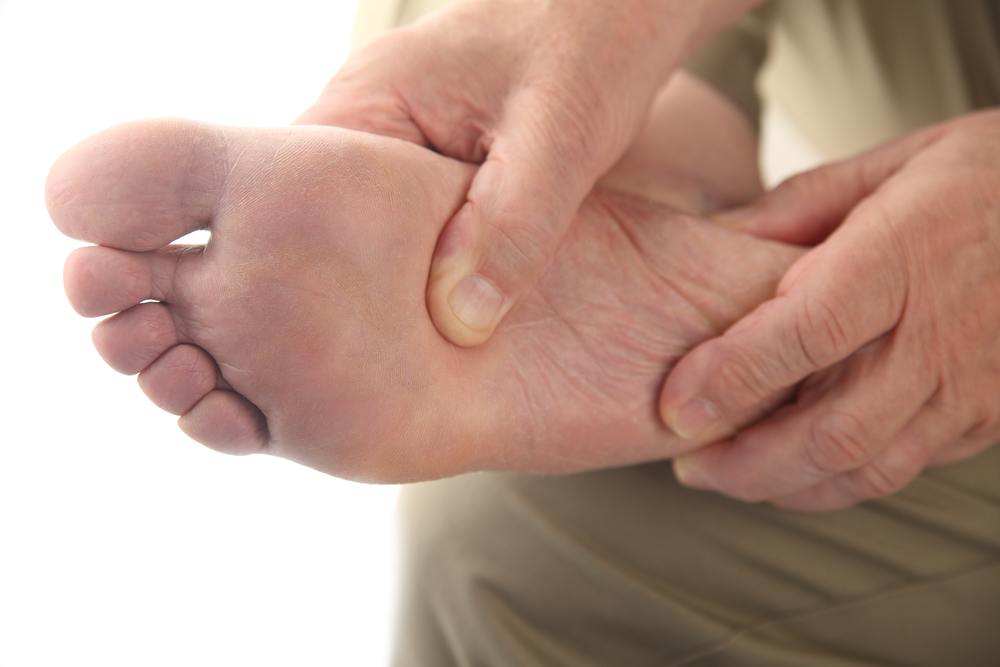Connect With Us
Blog

Sever's disease, also known as calcaneal apophysitis, is a common cause of heel pain in growing children. It occurs when the growth plate in the heel becomes inflamed due to repetitive stress or pressure. This condition often affects active children between 8 and 14 years old who are involved in sports that include running or jumping. Risk factors include rapid growth, flat feet, poor footwear, and intense physical activity. Symptoms may include heel pain, limping, stiffness, and tenderness in the back of the foot. A podiatrist can diagnose Sever's disease through a physical exam and recommend treatments, such as rest, stretching, proper footwear, and custom inserts. If your active child has heel pain, it is suggested that you visit a podiatrist for an accurate diagnosis and treatment plan.
Sever's disease often occurs in children and teens. If your child is experiencing foot or ankle pain, see Raul Hidalgo DPM from South Texas Foot & Ankle Care. Our doctor can treat your child’s foot and ankle needs.
Sever’s Disease
Sever’s disease is also known as calcaneal apophysitis, which is a medical condition that causes heel pain I none or both feet. The disease is known to affect children between the ages of 8 and 14.
Sever’s disease occurs when part of the child’s heel known as the growth plate (calcaneal epiphysis) is attached to the Achilles tendon. This area can suffer injury when the muscles and tendons of the growing foot do not keep pace with bone growth. Therefore, the constant pain which one experiences at the back of the heel will make the child unable to put any weight on the heel. The child is then forced to walk on their toes.
Symptoms
Acute pain – Pain associated with Sever’s disease is usually felt in the heel when the child engages in physical activity such as walking, jumping and or running.
Highly active – Children who are very active are among the most susceptible in experiencing Sever’s disease, because of the stress and tension placed on their feet.
If you have any questions, please feel free to contact our office located in San Antonio, TX . We offer the newest diagnostic and treatment technologies for all your foot and ankle injuries.

Diabetic foot problems can affect one or both feet and can occur in people with type 1 or type 2 diabetes. High blood sugar levels can damage nerves and reduce blood flow, making feet more vulnerable to injuries, infections, and ulcers. Symptoms include numbness, tingling, burning sensations, dry or cracked skin, swelling, and slow-healing wounds. Feet may appear discolored, swollen, or develop sores that do not heal. Due to nerve damage, pain may be minimal even with serious injuries. A podiatrist can diagnose diabetic foot issues with thorough foot exams, assessing circulation and sensation. Treatment focuses on preventing complications with regular foot care, custom orthotics, wound management, and patient education on hygiene and footwear. If you are dealing with this condition, it is suggested that you make an appointment with a podiatrist for evaluation and treatment.
Diabetic foot care is important in preventing foot ailments such as ulcers. If you are suffering from diabetes or have any other concerns about your feet, contact Raul Hidalgo DPM from South Texas Foot & Ankle Care. Our doctor can provide the care you need to keep you pain-free and on your feet.
Diabetic Foot Care
Diabetes affects millions of people every year. The condition can damage blood vessels in many parts of the body, especially the feet. Because of this, taking care of your feet is essential if you have diabetes, and having a podiatrist help monitor your foot health is highly recommended.
The Importance of Caring for Your Feet
- Routinely inspect your feet for bruises or sores.
- Wear socks that fit your feet comfortably.
- Wear comfortable shoes that provide adequate support.
Patients with diabetes should have their doctor monitor their blood levels, as blood sugar levels play such a huge role in diabetic care. Monitoring these levels on a regular basis is highly advised.
It is always best to inform your healthcare professional of any concerns you may have regarding your feet, especially for diabetic patients. Early treatment and routine foot examinations are keys to maintaining proper health, especially because severe complications can arise if proper treatment is not applied.
If you have any questions please feel free to contact our office located in San Antonio, TX . We offer the newest diagnostic and treatment technologies for all your foot and ankle needs.
Blog Archives
- July 2025
- June 2025
- May 2025
- April 2025
- March 2025
- February 2025
- January 2025
- December 2024
- November 2024
- October 2024
- September 2024
- August 2024
- July 2024
- June 2024
- May 2024
- April 2024
- March 2024
- February 2024
- January 2024
- December 2023
- November 2023
- October 2023
- April 2022
- March 2022
- February 2022
- January 2022
- December 2021
- November 2021
- October 2021
- September 2021
- August 2021
- July 2021
- June 2021
- May 2021
- April 2021
- March 2021
- December 2018
- November 2018
- October 2018
- September 2018
- August 2018
- July 2018
- June 2018
- May 2018
- April 2018
- March 2018
- February 2018
- January 2018
- December 2017
- November 2017
- October 2017


